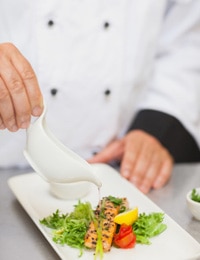
How healthy was the last meal you ate in a restaurant? Without being too unkind to chefs, I bet the chances are you’ll answer “not particularly”. But do restaurant chefs have a responsibility to serve healthy food?
The people at Unilever and the NZ Nutrition Foundation think they do. They have teamed up to launch Good Fork Week (this week, 4–10 March), an initiative designed to encourage chefs to “commit to making small changes to at least one dish on their menu to provide a more nutritious option to their diners and in turn take a step forward in tackling the obesity epidemic.”
Interestingly, Unilever’s research has found that 72 per cent of Kiwi diners say they would prefer to have slightly healthier food options when eating out, but more than half of the respondents perceived healthier options to be too expensive. I’m a bit surprised at that last part. Healthier meals will ideally have more vegetables (which when bought in season are cheap) and less typically expensive ingredients like meat, butter and cream. Meat portions in an ideal healthy meal would be smaller than those served in many restaurants, in theory saving money and making the healthier dishes also less expensive. Perhaps there are other reasons for healthy dishes being overpriced?
I’d venture to say that many chefs are not really very interested in cooking healthy dishes. Most chefs are really interested in maximising flavour, and the easiest way to do that is to add plenty of salt and fat. It takes more work and, some would say, more skill, to make healthy dishes that are packed with flavour, too.
Chef Michael Van de Elzen of The Food Truck fame, is the official Good Fork Week Ambassador and is one chef who thinks doing the work to make a menu healthier is worth the effort.
“As chefs we pride ourselves on our culinary skills and creativity. I really feel it’s important that healthy food forms an essential part of our restaurant offering”, he says. “If chefs care about their customers, they should care about this. If not, maybe they’re in the wrong business!”
Van de Elzen also thinks making small healthy changes to a menu can be good for business. He cites the example of vegetarian dishes on his own menus, and how paying care and attention to these dishes helps grow loyalty – people come back and bring others because they know there’s a wide range of healthy dishes on offer.
So if you’re eating out this week, why not ask what your restaurant is doing for Good Fork Week. Even better, every other week of the year ask questions, make requests and encourage your favourite places to do more and offer more that’s healthy on their menus. The most power we have is as consumers, and as with anything else we choose to spend money on, producers – in this case restaurants – will respond to demand from customers. If we don’t ask, we don’t get.
www.healthyfood.com










